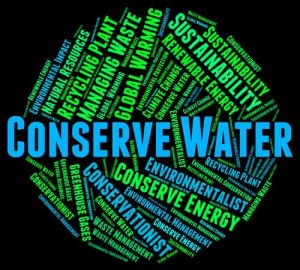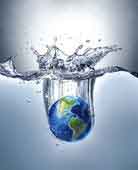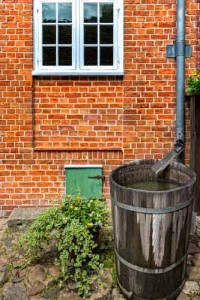Why Saving Water for Summer Months Is Key
Topics of drought and climate change headline the news, but what can homeowners do to save water, especially in the summer months? Most homes are set up for the mere process of the use and disposal of water, but many homes have no systems or products designed for saving, reusing or conserving water.
 As clean water supplies become a more precious resource across the world, examining the possibilities for saving water is key to being comfortable in the hot, dry summer months.
As clean water supplies become a more precious resource across the world, examining the possibilities for saving water is key to being comfortable in the hot, dry summer months.
Water Conservation in the Home
Simple steps in the home can save a tremendous amount of water when practiced on a daily basis. Simple changes in your habits such as taking shorter showers, not running the water when brushing your teeth and flushing toilets less frequently can save many gallons of water per day.
Additional steps, such as adding low-flow fixtures to showers and sinks, can be a simple remedy in a home with children who struggle to remember to turn off the water. The ideal solution is to use both of these simple options to save as much water in the home as possible.
Plumbing Must be in Good Condition
Keeping your plumbing in good condition is an important part of water conservation. A dripping faucet, running toilet or hose bib that leaks can waste many gallons of water each month. Plumbing damage that is hidden can cause problems in the walls, ceiling or flooring of a home, and it can create structural issues in addition to wasting water.
Having your plumbing assessed by a professional plumber and keeping an eye out for leaks or sudden increases in the cost of your water bill can help you to quickly identify new issues so they can be immediately repaired.
Although the primary goal is preserving water as a natural resource, simple changes to how you use water will also result in savings on your water bill. As clean water becomes more precious and scarce, the monthly costs from your local water utility will also rise. Saving money by conserving water has a double benefit, and you will enjoy the extra money in your pocket while you do your part in saving water for the environment.
Water Storage Within Your Home
 Storing water is an increasingly important way to ensure continuous water flow to a home, especially for irrigation of crops and other agricultural needs. In areas where water is scarce in the summers, water can be trucked in from other regions for basic needs. This is, however, expensive and is typically not sustainable.
Storing water is an increasingly important way to ensure continuous water flow to a home, especially for irrigation of crops and other agricultural needs. In areas where water is scarce in the summers, water can be trucked in from other regions for basic needs. This is, however, expensive and is typically not sustainable.
Rain catchment systems are a way to save water in the winter and use it as needed over the summer. Contemporary systems can provide clean storage that makes this water storage option safe for drinking water.
Complex plumbing systems can capture water from the roof of the home, and store it in cisterns for pressure-fed water supply throughout the home or garden irrigation. Systems that can switch between well or cistern use are uniquely sophisticated, as they can sense where water is available and draw from that resource.
The benefits of saving and using your harvested water are many, and although the initial effort to set up the system can be expensive, the future advantages and savings will be realized over many years.
Gray Water in Your Home
Gray water is the used – but mostly clean – water that is disposed of down the kitchen, shower and bathroom drain every day. This water can easily be reused for purposes such as flushing toilets and irrigating crops. A catchment system for gray water allows you to save this wastewater and use it for other uses.
A small amount of soap is not a deterrent for toilet water or irrigation water; gray water usage allows you to recycle your water and get the most out of it. Once it is flushed down the toilet, it is known as black water, and it requires sewage treatment before it can be reused.
Although rainwater catchment and gray water use are practical resources for conserving water, local laws may have restrictions on the types of water usage and requirements for the system set ups.
Your local building or land development office can provide information about local building codes, and a professional plumber can help you to interpret the local laws to design and install a system that will help you to conserve and reuse water in your home.
Saving Water in the Garden
Water waste in the garden is a common problem, as it is simple to overwater lawns, flowerbeds, and vegetable gardens or leave a hose turned on too long. Shallow, infrequent watering is a mistake that many homeowners make, and taking some small steps towards learning how to prepare plants for drought while keeping them healthy will go a long way towards water savings.

Plants that are allowed to develop deep roots in the search for water will become very resilient to water shortages. Watering plants deeply and infrequently will yield the best results.
Strategies for keeping plants well-watered and resilient to drought in the garden include:
- Using a rain gauge to measure water flow; one inch per week is typically adequate for most lawns and gardens
- Using a water timer to prevent overwatering or forgetting to turn off the water
- Using a water timer to water early in the morning or later in the evening to avoid evaporation in the heat of the day
- Installing drip-line irrigation to provide water precisely at the roots of each plant
- Choosing plants that thrive in your climate and can quickly adapt to soil types and conditions.
As you can see, a variety of options to conserve water are easily available, and your time and attention in pursuing water conservation for your home will help the environment while providing you with cost savings.
For professional plumbing repair, design and installation to conserve water in the Independence, MO area, please call All N One Plumbing at (816) 886-7600.


 You can rest easy knowing that you can trust us. With our 100% satisfaction guarantee and our free estimates, where can you go wrong?
You can rest easy knowing that you can trust us. With our 100% satisfaction guarantee and our free estimates, where can you go wrong?

